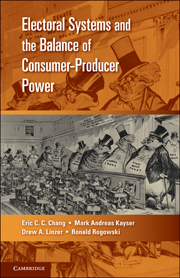Book contents
- Frontmatter
- Contents
- Acknowledgments
- 1 Introduction
- 2 Electoral Systems and Consumer Power: Theoretical Considerations
- 3 Electoral Systems and Real Prices: Panel Evidence for the OECD Countries, 1970–2000
- 4 Electoral Systems and Real Prices around the World
- 5 A Closer Look: Case Studies and Mechanisms
- 6 Socioeconomic Origins of Electoral Systems
- 7 Conclusion
- Bibliography
- Index
5 - A Closer Look: Case Studies and Mechanisms
Published online by Cambridge University Press: 05 June 2012
- Frontmatter
- Contents
- Acknowledgments
- 1 Introduction
- 2 Electoral Systems and Consumer Power: Theoretical Considerations
- 3 Electoral Systems and Real Prices: Panel Evidence for the OECD Countries, 1970–2000
- 4 Electoral Systems and Real Prices around the World
- 5 A Closer Look: Case Studies and Mechanisms
- 6 Socioeconomic Origins of Electoral Systems
- 7 Conclusion
- Bibliography
- Index
Summary
In the previous chapters, we have focused on building a theory of how electoral incentives tilt regulatory policy – and hence, price levels – toward producers or consumers. We have also endeavored to construct a persuasive empirical case that real price levels are indeed lower in majoritarian systems. Our results, although strongly robust over samples and methods, do exhibit one obvious limitation: they only capture the two endpoints of a long process between incentives and outcomes. How specifically do legislators bring about higher prices when votes are valued less and the obverse when they are valued more?
Our theory posits that regulatory policy is the key. Where legislators privilege producers, they insulate them from competition through regulations such as licensing schemes or barriers to entry for new competitors. Where consumers are ascendant, liberalization rules the day. Our theory is consistent with our results – producer-coddling regulation should raise real prices – but it is possibly not the only theory to connect electoral arrangements to price levels. Might other regularities between proportional and majoritarian countries explain price differences? Without a closer empirical examination of the mechanism, the actual policy-forming behavior of legislators under different electoral regimes, we cannot rule out rival explanations. We address these concerns here.
- Type
- Chapter
- Information
- Electoral Systems and the Balance of Consumer-Producer Power , pp. 135 - 180Publisher: Cambridge University PressPrint publication year: 2010



